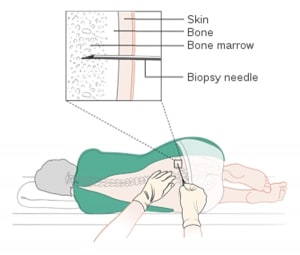A bone marrow aspirate is a test collects a sample of bone marrow, usually from the hip bone. There are two types of testing:
- liquid bone marrow (BMA)
- trephine marrow, where a small piece of bone is tested.
What is bone marrow?
Bone marrow is the spongy tissue inside bones where blood cells are made. The main function of bone marrow is to generate new blood cells which are essential for life. There are three main blood cell groups; red blood cells (responsible for carrying oxygen around the body), white blood cells (responsible for fighting infection) and platelets (responsible for blood clotting when bleeding occurs).
Why does my child need a bone marrow test?
Testing bone marrow is important to help diagnose and monitor a number of medical conditions pose a threat to healthy functioning bone marrow and prevent it from producing cells. A BMA to assess the functionality of the bone marrow cells or to check for abnormal cells. In some cases, a bone marrow trephine testing may also be requested.
What does it involve?
This procedure is often performed under a general anaesthetic. A general anaesthetic is a sleep-induced state given by inhaling anaesthetic gas or injecting medication. For a general anaesthetic, your child will need to fast (not have anything to eat or drink) beforehand. All fasting instructions should be given to you with your appointment letter.
Once your child is asleep, they will be positioned on their side and the doctor will insert a hollow needle into the pelvic bone (hipbone). In smaller children and babies, the leg bone may be the preferred bone for the bone marrow sample.
Once the needle is inserted into the bone (see illustration to the right) a syringe is attached and a small amount of liquid bone marrow is pulled out (aspirated) into the syringe. If a trephine test is requested, the hollow needle will be inserted further to capture a small piece of bone. The sample(s) is/are then sent to the laboratory to be examined, the needle is removed and the small injection site is covered with a pressure bandage.

Are there any risks?
General anaesthetics are very safe – serious complications are very rare. The anaesthetist will carry out a full examination and check your child’s medical history before the procedure. Some of the most common side effects with general anaesthetics are a sore throat or hoarse voice (usually from the breathing tube), nausea and vomiting (post anaesthetic), drowsiness and in very rare cases, an unexpected allergic reaction. Your anaesthetist will be able to discuss these with you further on the day of the procedure.
The area of skin where the needle has been inserted can sometimes bleed, leave bruising and be uncomfortable or painful afterwards, but this will disappear in time. Your child will be given pain-relieving medication should this be required after the procedure. A blood transfusion may be given in the very rare case of excessive bleeding.
There is a very small risk of infection at the injection site after the procedure, but this is very rare due to the extremely sterile steps taken while collecting the sample.
What happens after the test?
A BMA is typically performed as a day procedure which means your child is admitted and discharged the same day. Your child will recover on a ward where routine post-operative monitoring will take place. Should your child experience any of the symptoms mentioned above they may need to stay longer than usual but should still be able to go home the same day.
Most children can return to their normal daily activities including school once discharged home; however, we do advise that your child avoid any physical activities or sports for one week. The bandage covering the biopsy site should remain intact for 24 hours and can be removed easily during the next bath or shower.
Test results
Bone marrow aspirate samples usually take one to two days and trephine samples can sometimes take up to three days to process. Other specialist tests may take longer but this should be explained by your treating doctor.
When to seek help
See your GP if your child has any common symptoms.
- the biopsy site is bleeding
- signs of infection – oozing fluid or pus / redness / swelling / warmth or increased pain to the site
- if your child is unwell – temperature of 38 degrees or above / poor eating and drinking / more tired
- if you are worried for any reason following this procedure.
In an emergency, call Triple Zero (000) and ask for an ambulance.
If you're not sure whether to go to an emergency department, call 13 HEALTH (13 43 25 84) and speak to a registered nurse.
Developed by the Haematology Department, Queensland Children’s Hospital. We acknowledge the input of consumers and carers.
Resource ID: FS337. Reviewed: December 2018.
Disclaimer: This information has been produced by healthcare professionals as a guideline only and is intended to support, not replace, discussion with your child’s doctor or healthcare professionals. Information is updated regularly, so please check you are referring to the most recent version. Seek medical advice, as appropriate, for concerns regarding your child’s health.